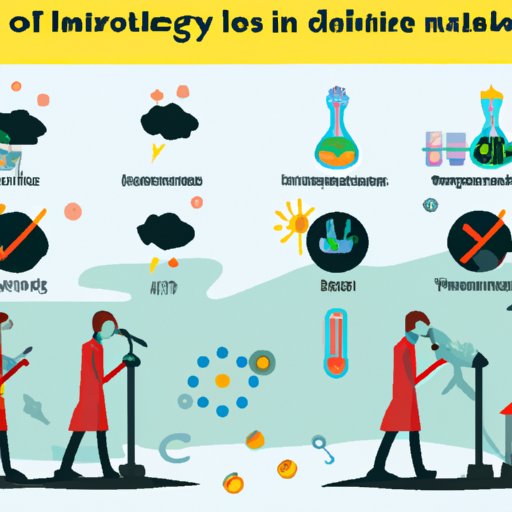Introduction
A science variable is a factor or condition that can be changed or manipulated during an experiment. It is the element being tested in order to measure its impact on the outcome of the experiment. Variables are essential components of scientific research because they allow researchers to accurately measure and analyze the results of their experiments. In this article, we’ll explore what a science variable is, the different types of variables, and how they can be used in everyday life.

Defining Science Variables: A Comprehensive Overview
Before diving into the specifics of science variables, let’s start with a basic definition. A variable is any factor or condition that can be changed or manipulated during an experiment. This can include anything from the amount of light in a room to the type of fertilizer used on a plant. Variables are essential components of scientific research because they allow researchers to accurately measure and analyze the results of their experiments.
There are several types of variables that can be used in scientific experiments. The most common types are dependent and independent variables, continuous and discrete variables, and qualitative and quantitative variables. Let’s take a closer look at each of these.
Exploring the Different Types of Science Variables
The first type of science variable is the dependent and independent variable. The dependent variable is the factor that is being measured and/or affected by the experiment. For example, if you were testing the effects of fertilizer on plant growth, the dependent variable would be the plant’s growth rate. The independent variable is the factor that is being manipulated in order to measure its effect on the dependent variable. In the same example, the independent variable would be the type of fertilizer being used.
The second type of science variable is the continuous and discrete variable. Continuous variables are variables that can take on any value within a given range, such as temperature or time. Discrete variables are variables that can only take on specific values, such as the number of plants in an experiment.
The third type of science variable is the qualitative and quantitative variable. Qualitative variables are variables that describe a characteristic of a subject, such as color or texture. Quantitative variables are variables that measure a numerical value, such as height or weight.

Understanding the Role of Science Variables in Experiments
Now that we understand the different types of science variables, let’s explore their role in experiments. When conducting an experiment, it’s important to identify the variables that will be tested. Once the variables have been identified, the researcher can then manipulate them in order to measure their effect on the outcome of the experiment. It’s also important to control the other variables in the experiment in order to accurately measure the effect of the variable being tested. For example, if you were testing the effects of fertilizer on plant growth, you would need to make sure all other factors, such as water and light, remained constant.
How to Measure and Analyze Science Variables
Once the variables have been identified and manipulated, the next step is to collect data. This can be done through observation, surveys, questionnaires, or other methods. After the data has been collected, it can then be analyzed using various statistical methods. These methods can help researchers interpret the data and draw conclusions about the effect of the variables on the experiment.

Examples of Science Variables in Everyday Life
Science variables can be found in many aspects of everyday life. For example, climate change is an environmental variable that affects the earth’s temperature, sea levels, and weather patterns. Disease outbreaks are another example of a science variable that can have a major impact on public health. Finally, human behavior is a social variable that can affect the way people interact with one another.
The Benefits of Knowing About Science Variables
Knowing about science variables can have many benefits. It can help researchers design better experiments and collect more accurate data. It can also help researchers interpret the results of an experiment in a more meaningful way. Finally, knowing about science variables can help us better understand the world around us and make more informed decisions in our daily lives.
Conclusion
In conclusion, science variables are essential components of scientific research. They can be used to measure and analyze the results of an experiment, and they can also be used in everyday life to better understand the world around us. By understanding what science variables are and how they work, we can improve our ability to design experiments, collect accurate data, and interpret the results in a meaningful way.
(Note: Is this article not meeting your expectations? Do you have knowledge or insights to share? Unlock new opportunities and expand your reach by joining our authors team. Click Registration to join us and share your expertise with our readers.)
